7 Machine Learning as a Service Platforms for Beginners and PhDs
Updated 26 May 2023
8 Min
4859 Views
Machine learning broke into our lives relatively recent even though the first computer learning software dates back to the 50s. Nowadays, developers progressively tailor this technologys capabilities to their projects making them even smarter and more beneficial. Thats why such giants as Google and Microsoft created their own machine learning platforms to move the whole industry forward and let developers easily integrate artificial intelligence features into their software.
In this article, we will cover a list of ready-made ML as a service platforms, as well as examples of apps that are already powered with machine learning.
What is MLaaS?
The same as SaaS or BaaS solutions, machine learning as a service platforms are intended to handle nearly all matters connected with infrastructure. So, developers are not obligated to messing with model training and evaluation, as well as worry about further cloud-based predictions.
You are probably wondering how to get the result of those predictions into your internal infrastructure. Everything is quite simple -- these two can be united by means of REST APIs.
Have a short of time until the deadline? Learn how BaaS services can help you to cut on the development hours
The fact of the matter is that cloud machine learning services help to build first functioning models that are able to bring you prized insights based on predictions. Furthermore, you don't even need a huge team of developers for that reason.
The most powerful and popular representatives of MLaaS on the market are Amazone Machine Learning service along with Google Prediction and Microsofts Azure Machine Learning that don't require much expertise in machine learning for getting started with them.
Best machine learning platforms
It is high time to consider in more detail the platforms that were already mentioned, as well as tell you about those ones that were not.
1.Google Prediction API
undefined
Pricing: Free up to 10K units / if the limitation in 10K units is exceeded then $0.50 per 1,000 predictions, $0.05 per 1,000 streaming updates, $0.002 per MB of trained data.
Google machine learning as a service offers developers a bunch of use cases among which are the detection of spam, sentiment analysis of customers, a recommendation system etc. The guides written for these cases will coordinate you during the creation of some basic models for them. It is worth pointing out the presence of pre-trained models provided by Google to facilitate the work of developers.
We should mention a well-written API documentation that helps developers to jump to working with the platform as quickly as possible. In general, this machine learning environment created in Google is good for ML integration into a project especially if you have short deadlines.
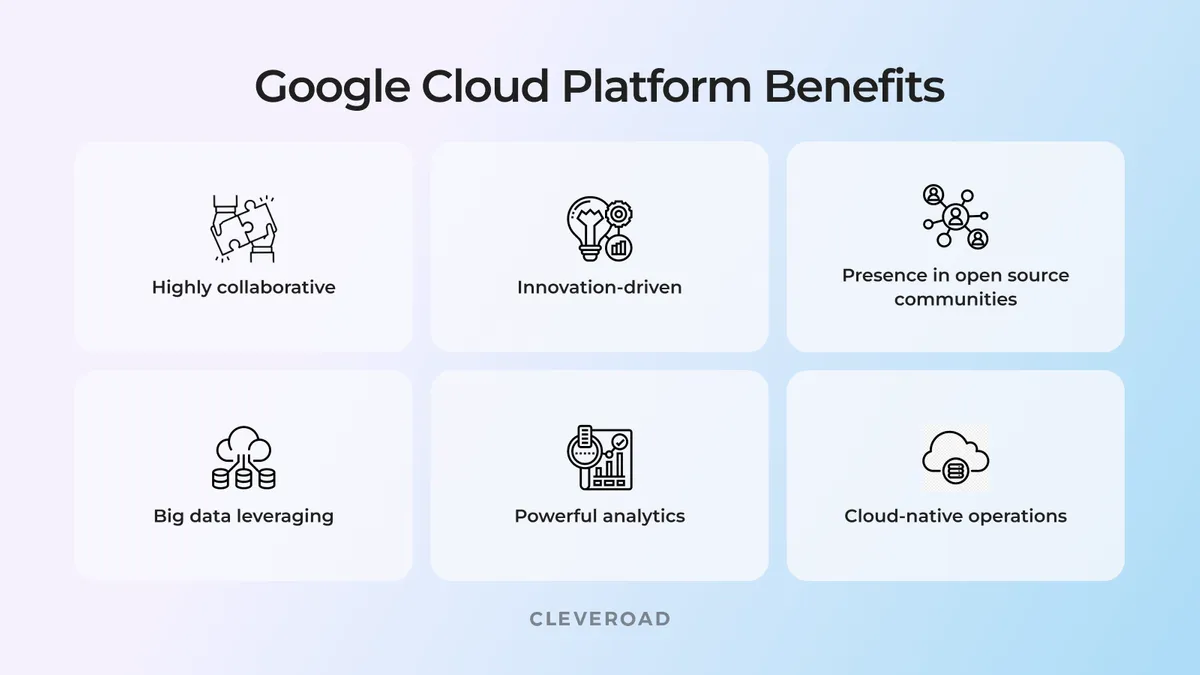
Google Cloud Platform advantages
2.Azure Machine Learning
undefined
Pricing: Free / $9.99 monthly
Azure ML is a visual interface contributing to model building and training, as well as choosing algorithms to apply. The service itself is focused around the ML Studio framework that allows you to create modular solutions.
This cloud-based machine learning platform is oriented on both newbies and data science adepts though nearly all it's operations can be performed manually. We should single out a good documentation along with tons of machine learning solutions stored in a so-called Cortana Intelligence Gallery that can be reused by other developers in the future.
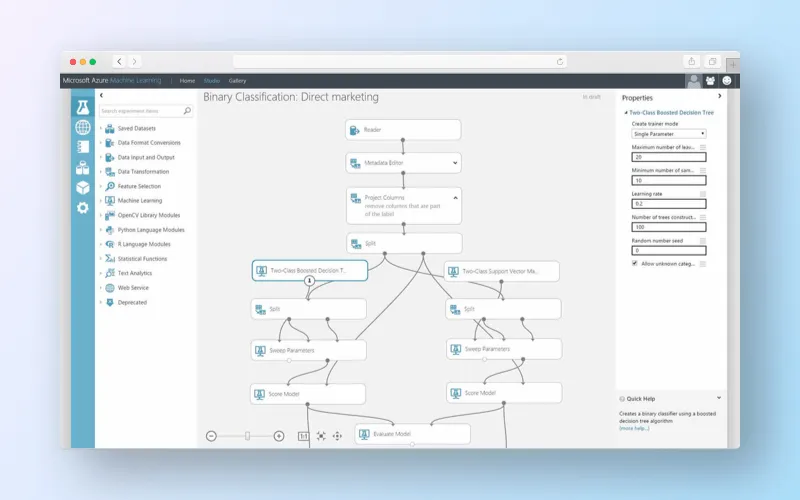
Model editor in Microsoft Azure ML
3.Amazon Machine Learning
undefined
Pricing: $0.42/hr for computing, $0.10/1,000 predictions
Amazon machine learning service is considered to be one of the market leaders. Respectively, it fits the projects with a tight deadline as well as possible. However, the level of automation of this service generates the limitation-related issues, so it is definitely not the most flexible machine learning solution on the market.
The use cases for this machine learning platform vary from classification of documents to detection of frauds. Besides, it has SDKs for different programming languages including Ruby, Java, Node.js, .NET and some others.
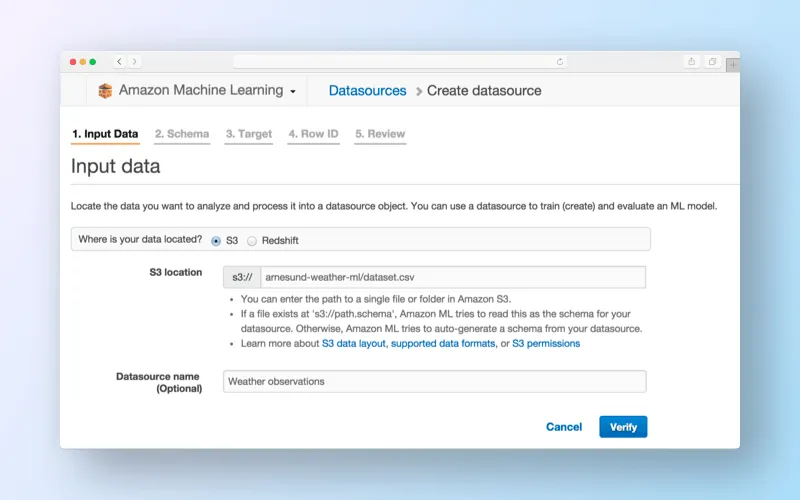
Adding data sources
4.BigML
undefined
Pricing: From free up to $10,000 monthly
Bearing in mind the diversity of it's audience, the company has tried to meet the needs of each user in multiple aspects starting from the wide range of prices and well-grounded documentation ending with flexible API.
This ML as a service platform can be used for basket analysis, predictive maintenance, customer segmentation etc. BigML offers a set of ready-made scripts even though it is small if compared to previous platforms.
5.PredictionIO
undefined
Pricing: Open source
If you would like to be in charge of the deployment of your machine learning -- thats what you are looking for. It is an open source server intended to let developers create predictive engines.
This open source machine learning server has SDKs for multiple programming languages including Java, Ruby, PHP, and Python. Besides, the community has put their efforts into implementing SDKs for other languages like Node.js, Swift, and several more.
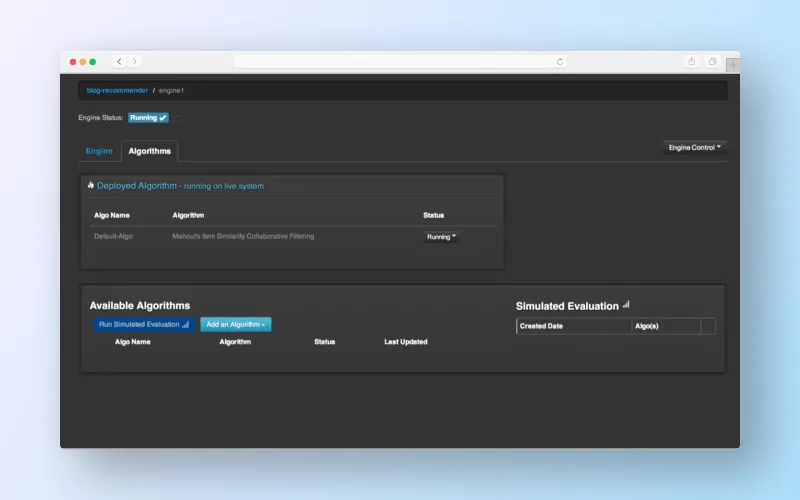
PredictionIO interface
6.IBM Watson
undefined
Price: From free up to $80 per user monthly
It is hard to call this solution from IBM a full-grown platform. The current capabilities of IBM machine learning as a service platform are restricted by data visualization and descriptions of how various data values interact with each other. In general, this service brings automated predictive analytics along with cognitive capabilities that are definitely good news for users without any computer science background. As for data scientists, this platform may seem to be quite limited right now. Nevertheless, thats too early for making any final conclusions concerning the platform because it continues to develop.
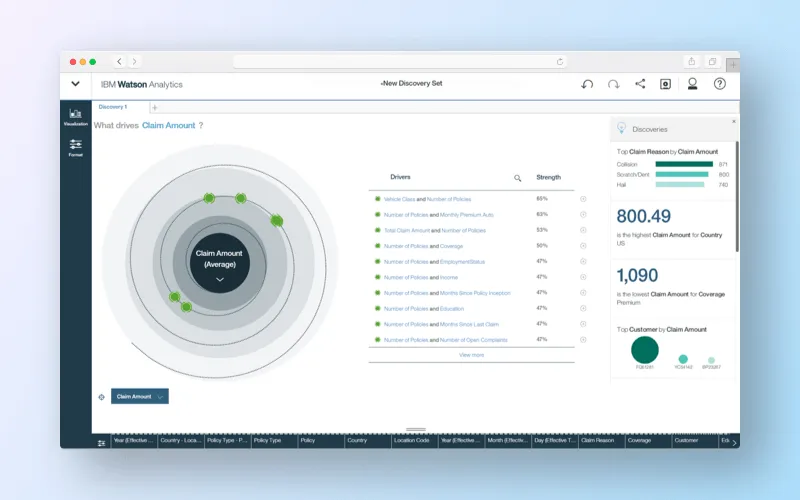
IBM Watson: Automated predictive analytics
7.Tensor Flow
undefined
Price: Open source
This is not exactly ML as a service but an open source library from Google that contains a bunch of machine learning tools. The library has no visual interface and oriented to developers who want to dive deeper into data science. To do that more smoothly, Tensor Flow is integrated into Google Cloud. Moreover, it can also be integrated with other service providers if necessary.
Choosing the best data storage solution
Searching for appropriate storage for collecting data and further processing it is no longer a challenging task. Commonly, for this purpose, both NoSQL and SQL databases are required. Such a combination is supported by a variety of well-known solutions like Amazon S3, Cassandra, Redfish etc.
Things are becoming more clear if you want to use machine learning platforms. No need to go far -- just use the same service provider for both data storage and machine learning. This way, you wont have any troubles with adjusting a data source. In case that is not an option for you -- some ML as a service platforms provide an integration with third-party data storages.
Apps that use machine learning
It's time to consider some app representatives that are already powered with the capabilities of machine learning.
Snapchat
Yeah, the favorite of hundreds of millions of users already applies deep machine learning to add more fun to snaps. Im talking about filters, they are powered with this technology for tracking users faces correctly and adding stuff like hats or glasses to their snaps. By the way, the company has started looking in the direction of machine learning after the acquisition of the Ukrainian company called Looksery that specialized in computer vision.
It is an easy task for humans to recognize someones face but a difficult one for machines. Thats why the algorithm behind this feature has been gradually studying to recognize not only faces but facial characteristics.

Computer vision for a face
Another not less popular social network doesnt stay away from the machine learning race. The company has found another interesting take on this technology. Now, the Instagram app uses artificial intelligence to block spam along with offensive comments. Users can switch this feature on or off in the app settings.

Instagram Comment Settings
So, the filters of Facebook-owned Instagram were trained by means of AI to detect and block unwelcome comments.
Twitter is also on the list of apps that use machine learning. This social network created the algorithmical feed that is available for users after they switch on Show me the best tweets first button in settings. The machine learning-based technology created by a team for app development from Twitter intended to evaluate tweets in real time based on multiple metrics.
In order to drive more engagement, this brainy algorithm matches the tweets evaluation with users preferences to display the only relevant content to them. Respectively, it is intended to increase the users activity, increasing the overall engagement rate.
Pinterest, like nobody else, knows the importance of relevant and customized content since the whole social network is built on it. In the year of 2015, Pinterest acquired a machine learning company called Kosei, the main expertise of which was in algorithms related to recommendation and content search.
Since then, the guys from Pinterest are so enthusiastic about machine learning that it is hard to find a feature where it is not still applied. They use machine learning to detect spam, personalize content, and even for advertising monetization purposes.
Salesforce
Of course, social networks are not the only ones that take advantage of modern technologies. The Salesforce CRM use machine learning to bring it's customers an opportunity for analyzing customer relationships inside and out. That fact takes the lead scoring to the entirely new level.
As you can see, there are lots of solutions that facilitate the creation of machine learning algorithms. Some of them require a background in data science or software engineering, some of them are automated though have limited capabilities.
Do not forget to subscribe to our blog to get customized weekly updates and contact us if you have any questions related to cooperation with us.

Evgeniy Altynpara is a CTO and member of the Forbes Councils’ community of tech professionals. He is an expert in software development and technological entrepreneurship and has 10+years of experience in digital transformation consulting in Healthcare, FinTech, Supply Chain and Logistics
Give us your impressions about this article
Give us your impressions about this article